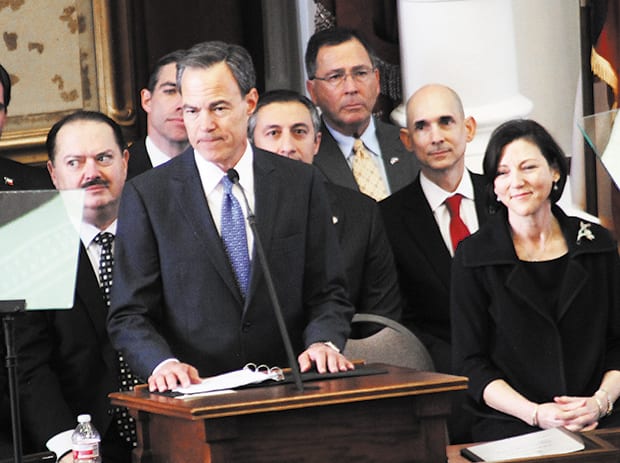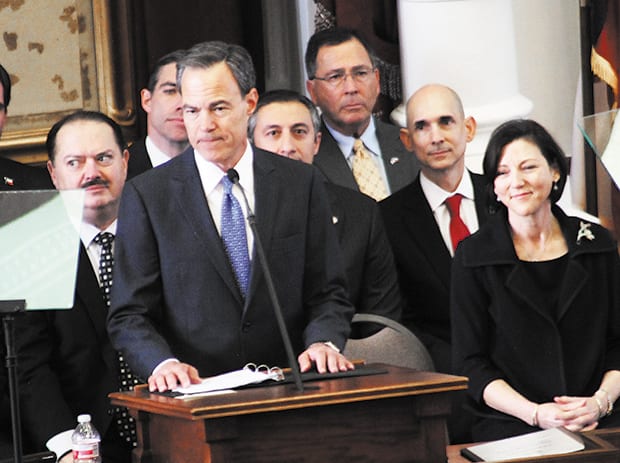As the 85th session of the Texas Legislature convenes some lawmakers seem consumed with where transgender people pee, but others intend to deal with actual issues

House Speaker Joe Strauss, right, surrounded by his wife and family, would rather talk about serious issues. (David Taffet/Dallas Voice)
DAVID TAFFET | Senior Staff Writer
When the Texas House of Representatives was sworn in on Tuesday, Jan. 10, a very different Texas government convened than the one that had reared its ugly face the week before.
Days before the House and Senate sessions began, Lt. Gov. Dan Patrick, along with Sen. Lois Kolkhorst, R–Brenham, unveiled Senate Bill 6 (referred to as SB6) that has quickly come to be known as the Texas Bathroom Bill. If passed, it would require transgender people to use bathrooms in public schools, government buildings and public universities based on their “biological sex” rather than the bathrooms appropriate for their gender identity.
The problematic bill doesn’t address whether someone’s birth certificate would be proof of “biological sex” or whether a corrected birth certificate issued by the state of Texas would be accepted as proof of someone’s sex. Nor does it say whether strip searches would be performed and addresses only trans women using ladies rooms, and it isn’t clear whether it intends for trans men to use the women’s restroom.

Lt. Gov. Dan Patrick, left, is focusing on bathroom business this session.
Because it will only take a few Republican votes in the Senate to kill the bill, Republicans who may have been wavering, thinking Patrick would challenge Sen. Ted Cruz in two years and would be gone from the Legislature, were put on notice when he announced his intention to run for a second term.
When the Texas House opened, no one referenced who should pee where and Republicans, who lead the House with a 95-55 majority, even took some subtle jabs at the incoming president.
Texas Secretary of State Rolando Pablos, recently appointed by Gov. Greg Abbott, welcomed immigrants: “We welcomed more Californians to their new home than any other state.” And he referenced Mexico as Texas’ largest trading partner.
While acknowledging different House members had different ways of getting there, the major concern of all Representatives is “to stand on behalf of the powerless.”
In the nomination speech for Speaker Joe Straus and three seconding speeches — by a tea party member who voted against Straus in the previous session, moderate Dallas Republican Linda Koop and a Democrat — all the lawmakers talked about similar qualities.
They all said Straus welcomes differing views, respects all members and keeps the House focused on important issues.
Then Straus, who was re-elected unanimously, spoke about his plan for the upcoming session. He said he will focus on solutions to education finance, the gridlocked transportation system, water issues, Child Protective Services and mental health issues.
In what some Dan Patrick supporters might have thought was a reference to their beloved bathroom bill, Straus cleverly began that portion of his address by saying, “Protecting children is one of the state’s most basic functions.” But he wasn’t referring to the supposed threat of where a transgender teen pees in school.
“Children should never live in fear of their own parents,” Straus said before calling for fixing the mess at CPS. “This is Texas, and Texas should be better than that.”
Speaker of the House is a powerful position. The Speaker sets the tone and the agenda of that chamber of the Legislature. And anti-LGBT legislation apparently is not on his agenda, while including Democrats in the process definitely is.
“Compromise is a good word in this House,” Straus said. “It’s how we find common ground.”
He called on lawmakers to show that they know how to solve problems. And if he wants, Straus can bury anti-LGBT legislation in committees that will let those bills die.
Bathroom politics did make an appearance in the House on Wednesday the second day of the session. But right-wing efforts to restrict restroom access failed.
Tyler Republican Matt Schaefer proposed a rule that basically would impost SB6’s restrictions on people in the Capitol during debate over a standard housekeeping resolution to set rules for people with access to the House chamber among other things. But Republican Charlie Green of Fort Worth raised a point of order noting Schaefer’s resolution wasn’t relevant because the State Preservation Board, not the House, decides on policies for the Capitol. Schaefer withdrew his proposal.
The conservative Texas Association of Business, which has condemned SB6, estimates Texas will lose as much as $8.5 billion — claim Patrick denied during a Wednesday press conference.
“Every report out of North Carolina shows they have the second-strongest economy in the country or the second-best place to do business, the second-best place where executives want to move their companies to. It’s having no effect,” Patrick said.
In fact, HB2 has had significant effect on the state financially, and in terms of reputation. In September, an article by Business
Insider estimated that North Carolina had at that time lost nearly $400 million in revenue because of the law, and that the NCAA and the ACA had both moved all of their championship games out of the state.
In late October, North Carolina’s then-Secretary of Commerce John Skvarla said at a press conference that HB2 fallout had not “moved the needle one iota” in terms of negatively affecting the state’s economy. But an analysis by Politifact North Carolina labeled that claim “mostly false,” and noted the state is likely to lose millions more in the years to come just as a result of actions already taken, such as the college sports organizations moving their championships.
Back in Texas, Rep. Rafael Anchia, D–Dallas, condemned SB6 as being vicious and said it would contribute to the already high suicide rate among transgender people.
Openly-lesbian Rep. Celia Israel, D-Austin, serves on the transportation committee and said she would rather spend her time working on the state’s actual problems. She said she sees some of the state’s worst traffic problems every day.
Likewise, Democratic Rep. Mary Gonzalez, who is pansexual and represents El Paso, is looking to Equality Texas to take the lead in killing the bad legislation that has been filed. She said she’d also like to work on the real issues affecting her constituents, like bringing running water to portions of her district where residents live without.
Other anti-LGBT legislation
Several anti-LGBT bills have already been filed in the Texas Senate, but only one that Equality Texas is tracking has been filed in the House. That House bill, filed by Weatherford Republican Phil King, would exempt religious student organizations from school nondiscrimination policies. Of course, the bill stipulates that discrimination has to be one of the organization’s “sincerely held religious beliefs.”
Looking ahead to this new session, Equality Texas Communications Coordinator DeAnne Cuellar said, “I believe we have more allies than ever.”
In addition to SB6, which she called “unnecessary, unenforceable and damaging,” her biggest concern is SB242 introduced by Konnie Burton, R–Fort Worth. Burton’s bill would require school employees to “disclose any personal, direct, or incidental knowledge regarding a child.” Opponents fear the legislation, if passed, could allow teachers and other school personal to out students to family and others.
Cueller called the bill tricky, because it gets into the parent-child relationship. “But,” she added, “we’re opposed. We’re always against outing.”
She explained that the only time the bill allows a counselor or other professional to opt out of divulging even something said in confidence is if the parent is being investigated for abuse. If a child speaks to a counselor or teacher, that school employee would have to let the parent know, even if the child fears being thrown out of the house if the information was revealed.
While the Texas Association of Business and the state’s many local visitor and convention bureaus have come out strongly against the bathroom bill, cities will be lobbying against bills that prevent local governments from enacting local ordinances that protect LGBT people. Cities worry about local control being taken by the state.
“Historically, that party has advocated for local control,” Cuellar said, referring to Republican attempts to take away local control in ensuring equal rights.
Pre-empting local nondiscrimination ordinances is lumped in with bathroom restrictions in North Carolina’s HB2, but Texas politicians have separated the two issues into two different bills, possibly in hopes people would find the discrimination easier to swallow if it’s fed to them in smaller bites.
While the expected deluge of anti-LGBT bills has not yet hit, a number of representatives have filed pro-LGBT legislation.
Four senators — Rodriguez, Garcia, Hinojosa and Whitmire — filed SB 165 to prohibit discrimination in employment, housing, public accommodations and state contracting in Texas.
In the House, bills have been filed to remove unconstitutional anti-LGBT wording from the penal code, to extend the “Romeo & Juliet defense” defense against statutory rape charges to gay and lesbian youth, to prohibit discrimination in each of the categories listed in the Senate bill, to prohibit travel to states that repeal nondiscrimination ordinances or proscribe discrimination, and more.
What about Abbott?
While the House Speaker intends to steer his chamber toward important issues of mental health, water, transportation, education funding and CPS, the lieutenant governor intends the Senate’s session to revolve around bathrooms. But where does the governor stand?
At the swearing-in session, Gov. Greg Abbott addressed the House. During his 10-minute speech, he didn’t mention a single issue facing the state. He didn’t refer to his lieutenant governor’s grandstanding attempt to save the state by regulating where kids pee in school. And he made no mention of the issues addressed by the House speaker.
Instead, he spoke in platitudes: “This is Texas and Texas is exceptional,” he said in various versions over and over again.
But should anti-LGBT legislation pass both houses, he’d be expected to sign that bill into law.
Equality Texas sponsors LGBT Advocacy Day at the Capitol on March 20 and encourages anyone who can come to Austin to participate in teams, visiting legislators’ offices to tell personal stories and let them meet LGBT people in their districts.
This article appeared in the Dallas Voice print edition January 13, 2017

